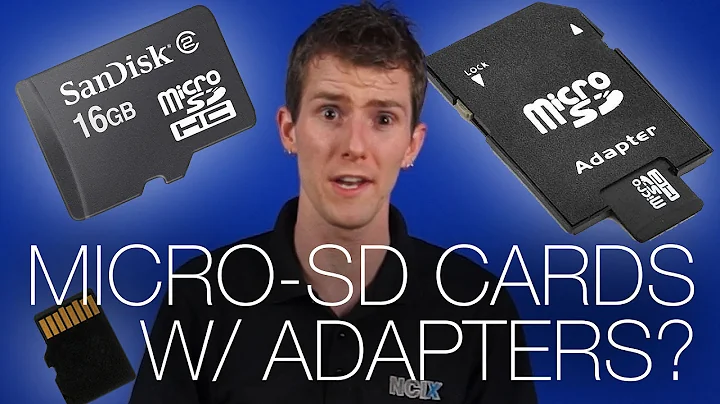Will there be a performance degradation when using a SD card with an adapter for a camera
Solution 1
Eugen Rieck's answer should be correct. There is nothing in the adapter that should affect speed.
Keltari's answer mentions what appears to be some anecdotal evidence of adapters slowing performance in some specific cases. I found a report of some testing that showed the adapter increased performance a negligible amount, which makes no sense, and they chalked it up to being within the margin of error.
Tons of these adapters are in use. There have been a few, but multiple, reports of performance degradation from the adapter. Other than the production testing performed by the manufacturer, there doesn't seem to be reliable testing to prove that an adapter is or is not capable of slowing down a microSD card's performance.
So what to make of this apparently conflicting information? At least some of the reports have come from people with enough technical background to suggest that they wouldn't publish such a report based on nothing but flimsy anecdotal evidence. It's possible that all of these reports are wrong; based on imagined results or poor measurement. But there's an alternate potential explanation.
The adapter is just a plastic shell that holds some metal extensions for the microSD contacts. The extensions go from fixed contacts where an SD card would have them to springy leaves that rest on the microSD card contacts. They're small and flimsy. An adapter and microSD card in good, clean condition should behave exactly like an SD card.
Any component of this nature can have marginal performance due to poor electrical contact. The microSD card contacts or the internal adapter contacts can get dirty, the contact leaves can lose some of their springiness through use and fatigue, or poor manufacturing, etc. That's a normal mode of failure.
But that failure isn't necessarily all or nothing. The problem can be marginal, and the card and adapter can continue to work but have unreliable data transfer. This could cause delays in the data transfer handshaking, or CRC errors that require transferring the data again. The result would be slower net performance.
I'm not saying that the reports of performance degradation are based on degradation that actually happened, and that this explanation is the reason why. I'm saying that this would be expected if the adapter was marginal in this way, and being marginal in this way is a normal mode of failure. Since there are so few reports, this is obviously not a common occurrence, but if they are real, there is a normal process that would explain it.
So perhaps the answer is that under "typical" conditions, there should be no difference, but there's the potential to have marginal conditions, in which case performance could be degraded. The degradation would be due to data transfer issues, not the microSD card, itself.
Solution 2
MicroSD to SDcard adapters are only mechanical adapters, they have no active components. This implies, that the performance of the MicroSD card will be the same whether it is in such an adapter or not.
Basically all modern cards are more than performant enough for cameras, especially if they are bigish.
Related videos on Youtube
Kushan Randima
I focus on web development in particular. Most of my experience comes from using technologies like Angular, .NET, HTML, CSS, SQL & Azure.
Updated on September 18, 2022Comments
-
 Kushan Randima over 1 year
Kushan Randima over 1 yearI am going to buy this camera with a 128 GB SD card. I would like to buy a Micro SD card instead of a full SD card as I can use the micro SD card with my phone to view the photos taken by the camera.
Will there be a performance reduction if I use the original adapter comes with the memory card?
-
sawdust over 5 yearsTechnically this question is off-topic because cameras write to the SD card using a different mode than what a PC filesystem uses. You cannot sensibly measure or compare the performance of a SD card using a PC with the performance in a camera (as the article in Keltari's answer does). So your question is unrelated to anything PC or computers.
-
-
 Kushan Randima over 5 yearsThank you so much for your answer. Since the data has to pass another layer, will there be any factor which can put a negative effect on the performance? Ex:- Resistance of the copper connectors.
Kushan Randima over 5 yearsThank you so much for your answer. Since the data has to pass another layer, will there be any factor which can put a negative effect on the performance? Ex:- Resistance of the copper connectors. -
Eugen Rieck over 5 yearsIf you are down to resistance of the copper contacts on a fundamentally digital device, that is mechanically moved, exposed to temperature and humidity changes etc. you have much bigger progblems than performance! Basically if it works, then it works full speed.
-
Keltari over 5 years@KushanRandima this answer is not always true
-
Eugen Rieck over 5 yearsFirst comment in the mentioned article: "This is nonsense and the evidence is purely anecdotal"
-
 fixer1234 over 5 yearsThe only thing I disagree with here is the last line of your comment. If it's functioning normally, it works full speed. But it is possible to have degraded electrical contact inside the adapter. It would still do everything at full (clock) speed, but it could also have to transfer some data multiple times. So the net performance could be degraded.
fixer1234 over 5 yearsThe only thing I disagree with here is the last line of your comment. If it's functioning normally, it works full speed. But it is possible to have degraded electrical contact inside the adapter. It would still do everything at full (clock) speed, but it could also have to transfer some data multiple times. So the net performance could be degraded. -
Eugen Rieck over 5 years@fixer1234 the SD protocol has no retransmit functionality. An "analog problem" will immediately show up as an IO error with the caveat of the OS maybe implementing retries.
-
Eugen Rieck over 5 yearsThe SD protocol has no retry functionality. This implies, that a failure through "marginal performance" translates to an IO error, not a performance degradation. If it works, it works full speed ... if it doesn't work full speed, it doesn't work at all.
-
 fixer1234 over 5 years@EugenRieck, I considered that that might be the case, so I did some reading on the protocol. The best detail I found was yannik520.github.io/sdio.html, which seems to indicate that the CRC is used to detect errors and repeat operations. Can you point me to something that addresses data not being resent? Also, on your other comment you indicated that the OS might be responsible for retries. Wouldn't that result in the same outcome?
fixer1234 over 5 years@EugenRieck, I considered that that might be the case, so I did some reading on the protocol. The best detail I found was yannik520.github.io/sdio.html, which seems to indicate that the CRC is used to detect errors and repeat operations. Can you point me to something that addresses data not being resent? Also, on your other comment you indicated that the OS might be responsible for retries. Wouldn't that result in the same outcome? -
Eugen Rieck over 5 yearsCRC is used to detect errors, but there is no resend mechanism in the protocol - the error is detected and pushed up the stack. No controllers I know of implement resend.
-
sawdust over 5 yearsThe SD interface is far more complex than any of you imagine. It can use a variety of voltages and clock frequencies. Initialization of the SDcard involves testing of these voltages and clock rates. Then there are several transfer speeds/modes to choose from. Even if there is no "resend mechanism in the protocol", the OS could could repeat the I/O operation before declaring failure, or the difference could be attributed a different operational mode with the adapter. Personally I've never noticed a difference in performance.
-
sawdust over 5 years@fixer1234 "The best detail I found was ..." -- The real documentation (available to the general public) is the SDIO Simplified Specification available at sdcard.org
-
sawdust over 5 years"If you are down to resistance of the copper contacts on a fundamentally digital device..." -- I was inclined to agree with your original answer, but then this comment response of yours betrays your simplistic viewpoint. This so-called "digital device" has to exist in an analog world. There is more to the copper traces (in the adapter) than just resistance. Those are conductors unlike a PCB, i.e. without the shielding of a ground plane.
-
 fixer1234 over 5 years@sawdust and Eugen, the discussion got too far out of my expertise and it would be good to get a more definitive answer. see Is there a known technical basis for an SD card adapter to degrade performance under any condition?. Want to take a stab at it? (BTW, edit suggestions on the question are welcome.)
fixer1234 over 5 years@sawdust and Eugen, the discussion got too far out of my expertise and it would be good to get a more definitive answer. see Is there a known technical basis for an SD card adapter to degrade performance under any condition?. Want to take a stab at it? (BTW, edit suggestions on the question are welcome.) -
sawdust over 5 years@fixer1234 "There have been a few, but multiple, reports of performance degradation from the adapter." "At least some of the reports have come from people with enough technical background..." -- You're the only one making this claim of multiple reports. Please provide some links.
-
Eugen Rieck over 5 years@sawdust - as I outlined above, the SD protocol will either have a successfull transfer or not, there is nothing in between. Whether an error is due to resistance, lack of shielding or whatever - it can either work (and work at full speed) or not. I appreciate that you have difficulties understanding that principle and you have my pity for that, but this doesn't change reality.
-
 fixer1234 over 5 years@sawdust, Keltari raised the issue in his answer and claimed multiple articles. That's actually what this answer responds to. But see chat
fixer1234 over 5 years@sawdust, Keltari raised the issue in his answer and claimed multiple articles. That's actually what this answer responds to. But see chat -
sawdust over 5 years"Keltari ... claimed multiple articles" -- You choose your words well, but apparently did not substantiate that claim. IMO there are no credible reports of degraded performance with an adapter.
-
sawdust over 5 yearsThat Michael Crider article is seriously flawed, and uses a bogus apples-to-oranges comparison to infer reduced performance is caused solely by the adapter. Comments to that article point out numerous other possible sources for the speed difference. Downvoted until you provide links to "multiple articles" that "verify ... this slowdown in speed using adapters".
-
 fixer1234 over 5 years@sawdust, I had addressed that in more detail in a long chat post and then deleted the chat after reframing the other question (forgot that I had also linked the chat here). If you click on the chat link above, it is still visible. Basically, I checked for the existence of other articles consistent with Keltari's answer, but my goal was not to evaluate or substantiate the claims. I tried to frame my perspective on the other question (and in that deleted chat).
fixer1234 over 5 years@sawdust, I had addressed that in more detail in a long chat post and then deleted the chat after reframing the other question (forgot that I had also linked the chat here). If you click on the chat link above, it is still visible. Basically, I checked for the existence of other articles consistent with Keltari's answer, but my goal was not to evaluate or substantiate the claims. I tried to frame my perspective on the other question (and in that deleted chat).




